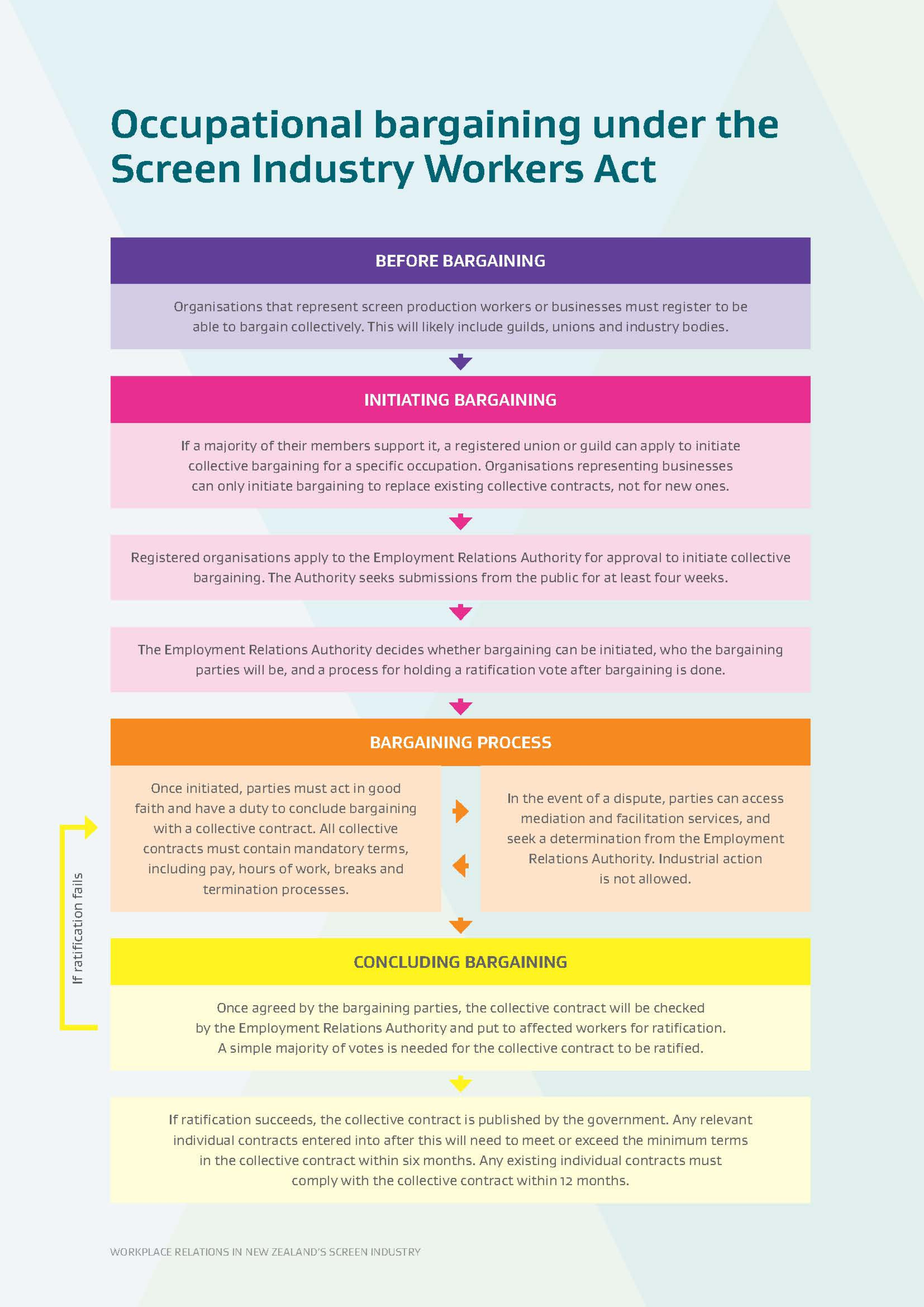Workplace relations in New Zealand's screen industry
Published: 17 Nov 2021Factsheet detailing the Screen Industry Workers Bill. Last updated 23 July 2021.
Type
File
PDF, 436KB, 4 pages


For more information about the Screen Industry Workers Act 2022, please visit:
Workplace relationships in the screen industry(external link) — Employment New Zealand
Whether someone meets the Act’s definition of a “screen production worker” depends on what productions they work on and the type of work they do.
Productions covered by the Act are films, programmes, commercials and games. Programmes not covered include news, sports, and those for training and instructional purposes.
A variety of people directly involved in the creation of these productions are covered by the Act. However, the Act does not cover staff providing support services, such as legal, accounting, marketing or management services that make a peripheral contribution to the creation of a screen production. The Act does not cover anyone working for a company whose primary business isn’t in the screen industry. Amateur and volunteer work is also excluded.
If a worker or production is not covered by the Act, then standard employment or contract law will apply, as relevant.
The Act allows collective bargaining to take place at 2 levels: across entire occupational groups or within a single production/company.
It is expected most collective bargaining in the screen industry will occur at the occupational level, which is described in the diagram below. These collective contracts will cover all work by a particular occupation of workers, across all screen productions covered by the Act.
The Act categorises screen production workers into the following occupations: composers, directors, game developers, performers, post-production technicians, production technicians and writers. These groupings can be modified if there are shifts in the screen industry workforce over time.

Text description of occupational bargaining flowchart
The Act also allows enterprise bargaining, which takes place within a single production or company. Enterprise contracts can’t go below the minimum terms set in any applicable occupational contract. There are also some differences in the process for negotiating enterprise contracts:
The Government wants to restore screen production workers’ right to bargain collectively, while allowing them to continue working as contractors.
A 2010 law change (known as the “Hobbit law”) deemed all screen production workers to be independent contractors, unless they have a written employment agreement. They also cannot challenge their employment status, effectively denying them access to employment rights like collective bargaining.
The Screen Industry Workers Act provides protections to screen production workers, while also giving the industry the certainty and flexibility it needs. It supports the industry’s desire to establish minimum standards, create clear expectations for production companies and workers, and prevent problems such as bullying, discrimination and harassment in the workplace.
In 2018, the Government convened the Film Industry Working Group, which brought together industry, business and worker representatives. This working group was tasked with designing a model allowing collective bargaining by contractors in the screen industry. The Government agreed to the working group’s recommendations in 2019, and implemented them through the Screen Industry Workers Act.
The Screen Industry Workers Act implements a model unanimously agreed to by representatives from industry guilds, unions and production companies, as well as the New Zealand Council of Trade Unions and BusinessNZ. It provides the basis for an enduring and well-supported workplace relations framework in New Zealand’s screen industry.
Collective bargaining will establish minimum terms and conditions, such as wages, overtime and holidays, helping to provide certainty for production planning. The nature and scope of these terms will be determined by parties during the bargaining process.
Once an occupational contract has been negotiated, existing individual contracts will have a year before they need to comply with the terms established through collective bargaining.
New Zealand is a globally-acclaimed destination for screen projects. We have a proven track record and excellent reputation, generated by the talented individuals involved in all aspects of screen production. A contractor-based model means continued flexibility within this expert and diverse workforce.
Factsheet detailing the Screen Industry Workers Bill. Last updated 23 July 2021.
PDF, 436KB, 4 pages
Crown copyright © 2025
https://www.mbie.govt.nz/business-and-employment/employment-and-skills/employment-legislation-reviews/workplace-relations-in-the-screen-sector/information-about-the-screen-industry-workers-bill-act-2022
Please note: This content will change over time and can go out of date.